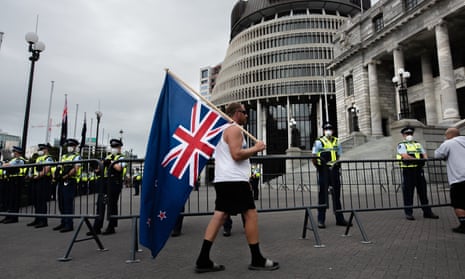On day two of a protest against New Zealand’s Covid-19 policies on Parliament’s grounds in Wellington, the stamina and consensus of the crowd was fraying. On Tuesday, thousands arrived in convoys from across the country, but by Wednesday just a few hundred were left, despite pleas from protesters on social media for the crowd to “hold the line”.
Perhaps it is because the list of complaints is extensive – there are signs about the vaccine mandates and restrictions for the unvaccinated, signs blaring vaccine disinformation, conspiracies that Covid-19 is a “plandemic”, worries about gene therapy manipulation of children, accusations of media corruption, claims of iwi (tribal) groups selling out, and requests to save a Northland oil refinery from closure.
Cars are scrawled with imported causes and slogans: “We stand with Ottawa”, referring to the Canadian protests against vaccine mandates and “drain the swamp”, a catch-cry of Donald Trump’s presidency.
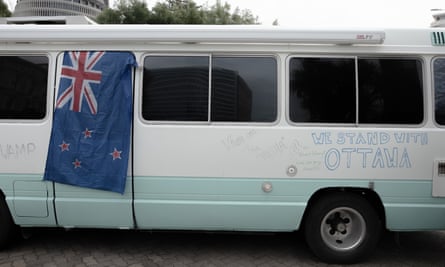
In October, the government released a new “traffic light” system for Covid management, including a legal framework for vaccination mandates that could affect around 40% of the workforce. The new rules loosen almost all restrictions for the fully vaccinated, but require vaccination certificates for entry into many businesses and for workers in public-facing roles like education, nursing, police and hospitality.
A protester stands on Parliament’s steps with a wall of masked police officers behind her and urges unity through a microphone. “Let’s remember why we are all here,” her voice echoes across the crowd, “the mandate”. Her own crowd boos and heckles her. “Don’t yell at me,” she pleads, before getting off.
In front of the woman, the grounds look like a small music festival. Roughly 50 tents are erected – people are picnicking, others are hula-hooping, children are playing. A convoy of Winnebagos, caravans and cars clog the streets around Parliament’s grounds.
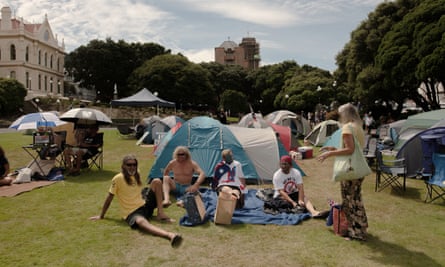
A singer dedicates a song to spirits and faeries, another raps about New Zealand being an apartheid state. A group of children perched on a fence yell: “Got a vaccine pass? shove it up your ass!”.
As some speakers preach for peaceful, respectful protest, three others attempt to break through the police barricade and are arrested – just hours after Parliament’s Speaker of the House, Trevor Mallard, issued the crowd with a trespass notice.
Others, wielding signs of love and unity, tell journalists they should be executed. A message scrawled in chalk on Parliament’s forecourt reads “Hang ’em high”, next to a smiley face.
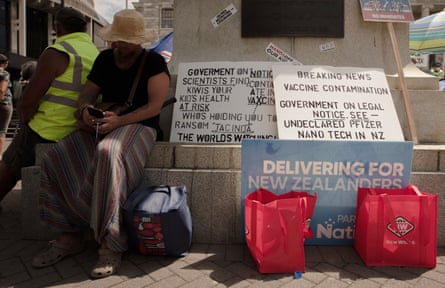
“Remove your mask,” a man demands, as I walk through the crowd. When I say I would like to keep it on, he immediately asks if I’m from mainstream media. I reply that I am and he says “don’t twist the truth just because you’re on the government dollars”. He is not the only one demanding I remove the mask.
‘Pretty antisocial and pretty abusive’
Across the road, at the Backbenchers pub, the staff are on high-alert. On Tuesday, they were forced to shut just 15 minutes after opening for the day, after protesters started hurling abuse.
“This is the most significant and volatile protest in 30 years,” its general manager and chef, Alistair Boyce, says. “There’s an inherent anger and feeling of injustice and overt intimidation that I’ve never witnessed before.”
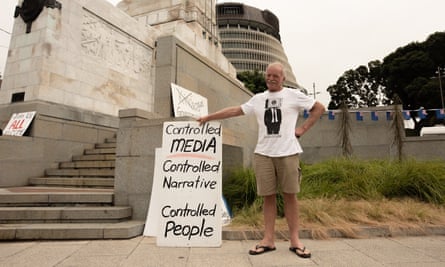
Usually protesters vent their anger at government, Boyce says, but this time it was turned against the restaurant, which is abiding by mandates and guidelines, including mask-use, vaccine passport scanning and limited gathering sizes. “We’re trying to operate the mandate as the government has required, so we were threatened and victimised.” Staff were told they were Nazis and violating human rights.
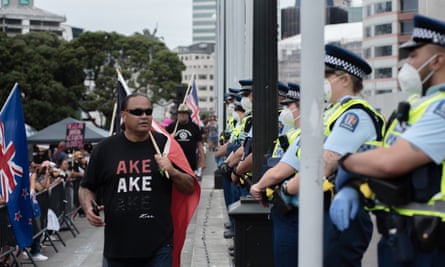
Boyce is sympathetic to the protesters’ concerns about the mandates, and would also like to see them removed, but adds he cannot support “the anarchy and the mob rule” of the crowd. “We’re a divided country turning on itself.”
Late on Wednesday afternoon, the crowd is slowly thinning and the mood is more subdued – less anarchist uprising; more picnic in the park.
And while consensus among the protest group is looking shaky, there was unusual consensus from the other side of the barricade: Parliament. Not a single politician met the protesters.
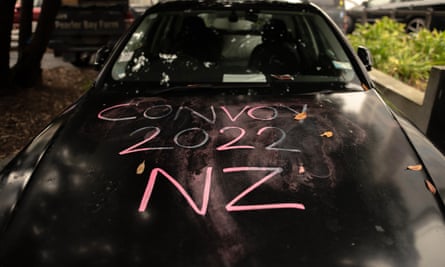
The prime minister, Jacinda Ardern, said on Wednesday that New Zealanders had a right to protest. “But New Zealanders also have the right to be vaccinated and the right to be kept as safe as possible in a pandemic and that’s exactly what we’re focused on – and that’s what the vast majority of New Zealanders are doing.”
National party leader Christopher Luxon strained to pinpoint exactly what the protest was about.
“I think there’s a range of protests out there, it’s very confusing to work out what it is. Essentially I think it’s not fair … when you’re impinging on others’ freedoms as they are, by blocking roads and making it difficult to get to and fro from work – that’s not what it’s about.
“I appreciate that there’s a range of views, but bottom line what we’re seeing there is pretty antisocial and pretty abusive.”
